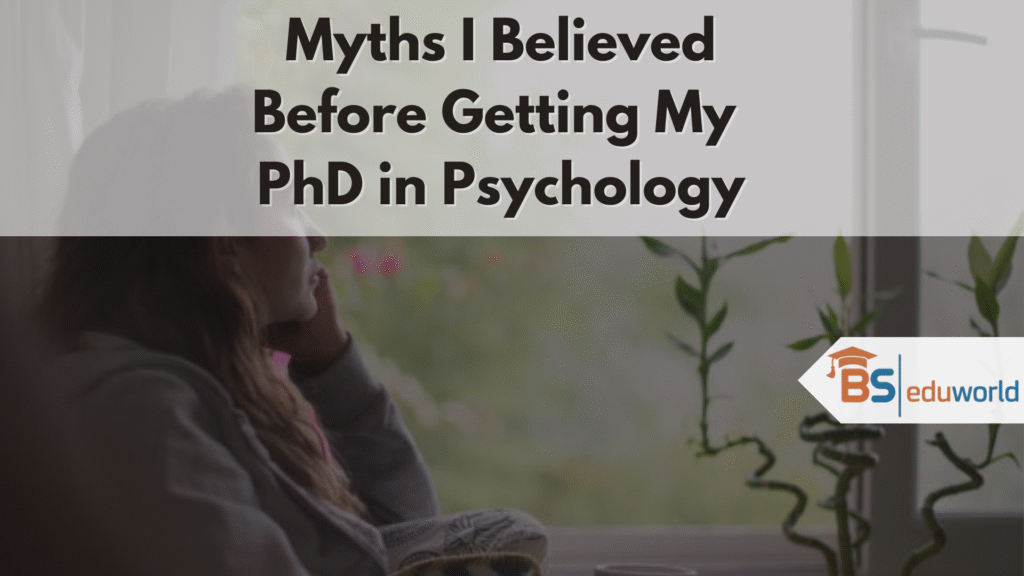When I began my journey into the world of psychology, I, like many, carried a backpack full of misconceptions. The path to earning my PhD in Psychology wasn’t just about accumulating knowledge; it was about unlearning outdated ideas and replacing them with evidence-based truths. This process of intellectual humility is crucial for anyone seeking to understand mental health, whether you’re a student or simply curious about the mind.

Here are five common mental health myths I once believed—and what I discovered instead.
The Myths vs. The Reality: A Quick Guide
| The Myth I Believed | The Evidence-Based Truth I Learned |
|---|---|
| 1. Anxiety is a sign of weakness. | Anxiety is a medical condition involving genetics, brain chemistry, and environment. It’s not a character flaw. |
| 2. Willpower is unlimited. | Willpower is a finite resource that depletes. Success relies on habits and environment, not just brute force. |
| 3. Only major events cause trauma. | “Little-t traumas” from chronic stress or neglect can be just as impactful as major catastrophic events. |
| 4. Therapy is just talking. | Therapy is a structured, skill-based process for learning tools to manage thoughts, emotions, and behaviors. |
| 5. Mental illness leads to violence. | People with mental health conditions are far more likely to be victims of violence than perpetrators of it. |
Myth 1: Anxiety is a Sign of Weakness
This is perhaps one of the most pervasive and harmful myths. I used to think that people with anxiety disorders just needed to “toughen up” or “get over it.” My studies in clinical psychology revealed how profoundly wrong this is.
The Truth: Anxiety disorders are legitimate medical conditions involving complex interactions between genetics, brain chemistry (like neurotransmitters), personality, and life events. They are not a character flaw. Framing them as a weakness prevents people from seeking the help they deserve, which often includes therapy (like CBT) and sometimes medication. Anxiety is a sign of a body and mind in overdrive, not a weak will.
Myth 2: Willpower is Unlimited
I believed that strong-minded people could power through anything with sheer willpower. If someone failed to stick to a goal, I secretly thought they just didn’t want it badly enough. My PhD in Psychology research into self-regulation and executive function completely dismantled this idea.
The Truth: Willpower is more like a muscle that fatigues with use—a concept called “ego depletion.” Decision-making, resisting temptations, and focusing all draw from the same cognitive resource. The science shows that successful habit formation relies less on brute force and more on designing your environment, setting tiny goals, and building routines to conserve mental energy.
Myth 3: Only Major, Dramatic Events Cause Trauma
I used to think trauma was reserved for survivors of war, assault, or catastrophic accidents. My graduate training, particularly in developmental psychology, taught me that trauma’s impact is far more nuanced.
The Truth: Psychologists now understand “little-t traumas.” These are chronic, less dramatic but deeply impactful experiences like childhood emotional neglect, bullying, or growing up in a high-conflict home. The defining feature of trauma is not the event itself, but the nervous system’s response—feeling overwhelmed, helpless, and unable to cope. This understanding validates so many more people’s experiences.
Myth 4: Therapy is Just Talking About Your Problems
My simplistic view was that therapy was an expensive chat with a friend. I didn’t grasp the structured, skill-based framework that defines modern therapeutic modalities.
The Truth: Evidence-based therapies are goal-oriented and actionable. Modalities like Cognitive Behavioral Therapy (CBT) or Dialectical Behavior Therapy (DBT) are more like taking a course on your own mind. You learn practical tools to identify cognitive distortions, regulate emotions, and change behavioral patterns. It’s active, challenging, and profoundly transformative work.
Myth 5: People With Mental Illness Are Usually Violent
This myth is heavily reinforced by sensationalized media portrayals. It creates stigma and fear, isolating those who need support the most. The data I worked with during my PhD in Psychology tells a very different story.
The Truth: The vast majority of people with mental health conditions are not violent. In fact, they are far more likely to be victims of violence than perpetrators. Factors like substance abuse and a history of violence are much stronger predictors. This harmful stereotype is a significant barrier to empathy and community integration.
The Takeaway: Always Keep Learning
Unlearning these myths was a cornerstone of my education. It taught me that the field of PhD in Psychology is always evolving, and so is our understanding of the human experience. If you’re passionate about delving deeper into these truths, pursuing a formal education in PhD in Psychology can be one of the most rewarding journeys you’ll ever take.
It opens your eyes not just to the science of the mind, but to the profound resilience and complexity of the human spirit.
- Explore accredited PhD in Psychology
- Schedule a consultation with our traditional medicine career advisors
